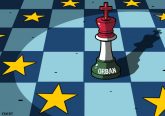The Italian right, led by the Brothers of Italy, is likely to be in government after the September 2022 elections. Despite its public statements expressing ‘full support’ for the European integration process, Giovanni Capoccia says that there are good reasons to question the exact nature of this commitment
Italy heads right
Mario Draghi’s successor after the general election in Italy on 25 September will likely be the leader of the right-wing party Fratelli d’Italia (Brothers of Italy), Giorgia Meloni. Currently polling at 23–24% of the vote, the party is the largest member of the centre-right coalition. In this coalition, the ‘right’, which includes the League (Lega, currently 13–14% in the polls), dominates the ‘centre’.
The alliance is expected to secure a clear majority of seats in parliament and form the next Italian government. The parties making up the coalition have agreed that if they do win, the largest party among them will choose the PM. In all likelihood, this will be Meloni.
Ending the right’s Eurosceptic reputation?
The Brothers of Italy holds Eurosceptic views similar to those of other European radical-right parties. Meloni is the President of the supranational European Conservative and Reformist Party. This group includes the Polish Law and Justice Party, PiS, which has long challenged the EU legal system, as well as Eurosceptic right-wing parties such as Vox in Spain, and the Swedish Democrats. On the brink of power, Meloni has sought to reassure voters of her party’s commitment to EU integration.
The Brothers of Italy holds Eurosceptic views similar to those of other European radical-right parties, but Meloni has sought to reassure voters of her party’s commitment to EU integration
The coalition’s political programme, Per l’Italia (For Italy), opens with a statement of ‘full support’ (piena adesione) for the process of European integration in the context of the country’s loyalty to NATO and the Western alliance.
Earlier, Meloni had released a public statement in three languages, in which she made similar commitments. Parts of the media interpreted this as a ‘moderate turn’ for the Brothers of Italy, known for their Eurosceptic positions.
A change of strategy for Eurosceptics
Yet, caution is in order. After the Brexit referendum, several European radical-right parties flirted with, and in some cases openly advocated, exit for their country. A notable case is that of the French Rassemblement National.
Marine Le Pen’s defeat in the 2017 presidential elections, however, quickly showed that those who advocate exit aren’t necessarily backing a winning horse. This is especially the case for Eurozone countries like Italy and France, both currently grappling with high public debts. The post-Brexit political crisis in the UK has probably reinforced this view among European electorates.
Still, it would be premature to conclude that European radical-right parties have substantially changed their opposition to continental integration. They typically see it as an unwelcome ‘interference’ by EU institutions in domestic politics. What has changed are their tactics. They no longer seek to break up (or break from) the bloc but to ‘hollow it out’, turning it into a much looser community of nations. This is an old theme for some currents of the European right, but in today’s conditions, its implementation would entail significant disintegration of the bloc.
Eurosceptic radical-right parties have changed their tactics, seeking not to break away from the bloc but to ‘hollow it out’
Marine Le Pen’s preferred EU reform, for example, would strip the Commission of all powers, turning it into a ‘secretariat of the Council’. But an EU where nation-states decide everything is an EU which will decide virtually nothing of consequence.
A ‘more political and less bureaucratic EU’?
The Italian centre-right manifesto claims that the coalition supports a ‘more political and less bureaucratic EU’. We can interpret the statement in exactly the same vein.
The EU’s current international political conjuncture has two essential characteristics. One is that the bloc’s level of political and monetary integration would render its break-up very costly. At the same time, the EU’s influence and cohesion as an independent political actor is increasingly threatened by external and internal enemies. In this context, a generic commitment to a ‘reformed EU’ means little.
Under current conditions, fully supporting European integration would mean – at minimum – quite specific things. Among these are supporting the abolition of individual member states’ veto power; encouraging robust responses to the Hungarian and Polish government’s ongoing challenges to the rule of law and the EU legal system; holding firm on the Northern Ireland Protocol, which is increasingly jeopardised by the current, and likely the next, British executive; advocating integration in sectors such as health policy; and pushing for full implementation of the Digital Market Act.
Meloni, Salvini, and EU disintegration
On most of these issues, however, the record of Meloni’s Brothers of Italy and Salvini’s League towards the EU is literally the antithesis of being ‘pro-integration’. Both have repeatedly endorsed Orbán. Although they have condemned the invasion of Ukraine, they and their ally Berlusconi have in previous years endorsed Putin in various ways. The Brothers of Italy voted against the Quirinale Treaty, which reinforces cooperation between France and Italy in the context of the EU. In 2018, Meloni filed a constitutional reform project to eliminate the supremacy of EU law. The centre-right may have the numbers to approve this, which would put Italy on the same side as Poland in challenging the EU’s legal system. The list is long.
The record of Meloni’s Brothers of Italy and Salvini’s League towards the EU is the polar opposite of ‘pro-integration’ – and while it’s unlikely they would immediately provoke a clash, it would be naïve to expect their ‘full support’ to EU integration
It is unlikely, of course, that an Italian centre-right government would immediately provoke a clash with the European Commission. At stake is the disbursement of the remaining tranches of the €191.5bn Next Generation EU funds. Only about €24bn of these have been paid so far. In their vague coalition manifesto, they state that they plan to ‘renegotiate’ it in the face of changed needs and circumstances. Tellingly, though, the manifesto also evokes longstanding disputes. These include the intention not to implement the 2006 Bolkestein directive on the internal market for services which, for certain sectors, the centre-right has been fighting for more than a decade.
The Von der Leyen Commission has shown flexibility with right-wing, Eurosceptic member-state governments. Hence, renegotiations are not necessarily doomed to failure. Even so, it would be naïve to expect a Meloni-led Italian government to provide ‘full support for EU integration’. It will be much more likely to side with those who want to ‘hollow out’ the bloc.
This article was originally published at The Loop and is republished here under a Creative Commons license.






